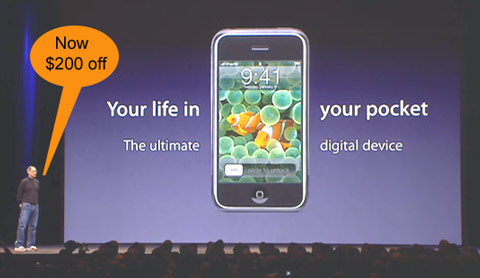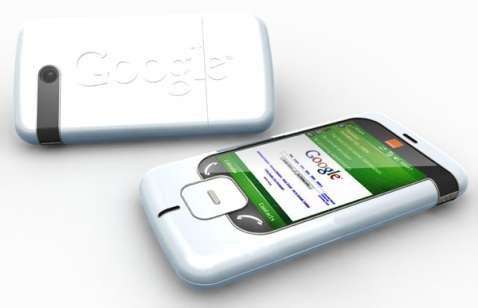iPhone's $200 Price Cut = $2 Billion Customer Handout

On September 5, Steve Jobs confirmed the massive margins of iPhone when he announced an unprecedented $200 price cut on the device within 10 weeks of its introduction. It's been justified as a trend in the technology industry but I think the real reason runs deeper than that. Just consider that the reduction is 33% of original price ($599) and a whopping 50% of the new price ($399). Such cuts have *never* been seen in the industry for a mass produced consumer product.
If that wasn't enough, Jobs even announced that Apple will pay back $100 to every iPhone owner so far, after several Apple loyalists revolted saying that they have been duped for being Apple fans. While much is being written about Apple's generous gesture and what it means for Apple as a brand, nobody seems to have done the numbers to calculate the financial cost to the company.
What Does It Mean: Unprecedented Profit Margins
So here's an attempt to see what it means to take $200 off, what is now, a $400 product. Over 800,000 people have purchased an iPhone so far (from Apple's estimate of 1 million sales by end of September) out of its 10 million target by end of next year. That translates to Apple handing out more than $80 million to iPhone customers now ($100 x 800,000) and $1.84 billion over the next 16 months ($200 x 9.2 million).
Irrespective of the reasons, one thing that's abundantly clear from Steve Job's $1.92 billion handout is that Apple's profit margins for the device are way beyond anything ever seen in the industry.
When Jobs first introduced the iPhone on January 10th, I wrote a few hours later that it's poised to become Apple's most profitable product in its entire history. I based that on the simple premise that even with a two year contract, the phone is still not subsidised as is the industry norm. So naturally there's a sum that AT&T is passing to Apple for every sale of the mandatory contract. A few weeks later, details emerged that it's even better than that - Apple also has a share in monthly payments that AT&T receives from iPhone owners.
We don't know if it's a one time cash deal or AT&T shares revenue on some other basis. Lets assume that Apple gets $300 for every iPhone sold (@$399) and $10 from each month's bill. If Apple achieves its target of 10 million phones by end of 2008 (18 months from its release), that's an earning of whopping $8.8 billion. A very small part of which is the actual hardware cost.

Compare iPhone's profit with the puny margins in gaming consoles or the PC industry. It's well known, for example, that both Microsoft and Sony sell their consoles for loss in hope of making it up over sales of games. This is in a market that sold just 26 million units last year. On the other hand, there were 957 million mobile phones sold the same year.
Clearly, Apple hit a jackpot with iPhone. There is no other category of mass produced consumer product that makes that kind of margin on those kind of numbers.
Real Reason Behind Price Cut: Preempt Competition
There's little doubt therefore that iPhone will make a windfall of money to Apple's bank balance. But why did Jobs have to give such a large cash handout? No matter how high the margins, no company likes to part with such a sizable amount. Apple isn't known for increasing value by reducing price. They do it by giving more at the same price with regular product revisions. So what has changed since Jobs announced the price in January?
The stock market which drove Apple's stock down at the news thinks it's poor sales behind the move. Nothing could be further from the truth. A number of analysts have pointed out that there's no way that could be the reason. There is no "fatal flaw" with the phone either. In fact, several customer surveys say iPhone buyers have overwhelming voted in the favor of the device.
There may be truth to the argument that it's merely because Apple wants to hit economies of scale. Yes, but is it a planned move on the lines that - milk the first few months of crazy iPhone madness and then reduce price to expand the market - I doubt it. Before Jobs announced the price in January, nobody could have predicted the media frenzy that followed at the time and then again at iPhone's launch. Somehow I can't justify that Apple had planned a $200 cut from the start.
What seems much more likely is that this a reaction to Google Phone and other competitors planning to enter the market. The much talked about Google device which was just fiction a few months ago has now become an almost certainty. A number of people have cited inside sources to claim that the Google Phone is real. The latest revelations come from a Boston Globe article from three days before Apple's announcement that cite a number of people having seen the phone.

In his address at Moscone center and later in interviews, Steve Jobs repeatedly said he wants to be "even more aggressive." But hey, aggressive with what? Apple truly doesn't have any competition! Sales figures for the month of July suggest that iPhone is the only smart phone out there selling like that and despite the prohibitive price, it's already equaling sales of much lesser price phones.
So where's the need to be aggressive? Clearly this is not about today but about future competition. Usually Apple has competitors petty much in knots as to how and where to strike at Apple's offerings. But this time things went a little differently. Remember that Apple, which loves to keep their products secret until the very last moment, was forced to announce iPhone six months in advance of the launch because of FCC disclosure. This essentially gave the Nokias and the Googles a generous lead of half a year to plan their offerings.
Things have changed since Apple's announcement in January. Google isn't the only one entering the market. Microsoft, which had previously ruled out a Zune phone, now admits the idea is "not unreasonable." I'm sure RIM, Palm, Nokia and other cell phone makers are prepping up launch of their own "iPhone killers" as the media would call them. Although I've little doubt that Apple will maintain its lead, the company isn't leaving anything on chance. With the price cut, Apple has clearly made a preemptive strike to ensure they have a smooth run.
And this is absolutely the right time to strike. If they had made such a large reduction after the announcement of Google Phone or another competitive product, their stock would have really taken a beating. Besides, it would reflect very poorly on the brand. Apple has never been known to indulge in price wars with a competitor.
I don't know if Steve jobs plays chess, but if he does, he must excel at it. You have to credit this man's vision for anticipating moves of future competitors and disarming them before they even enter the battlefield. It takes courage to give away $2 billion.
Related links
MSNBC reports on the Apple's $200 price cut and $100 rollback
CNBC video on Apple's inexplicable price cut
IT Wire: US iPhone sales go ballistic in July
Boston Globe article: Introducing the Google Phone
Gizmodo: Microsoft Admits Zune Phone Not Unreasonable
Past iPhone posts from Orange Hues blog
Jan 10, 2007: First to identify Apple's large profit margins behind iPhone
Jan 10, 2007: First to identify real reason behind iPhone's future success
Jan 12, 2007: First to identify another cell phone using multi-touch

